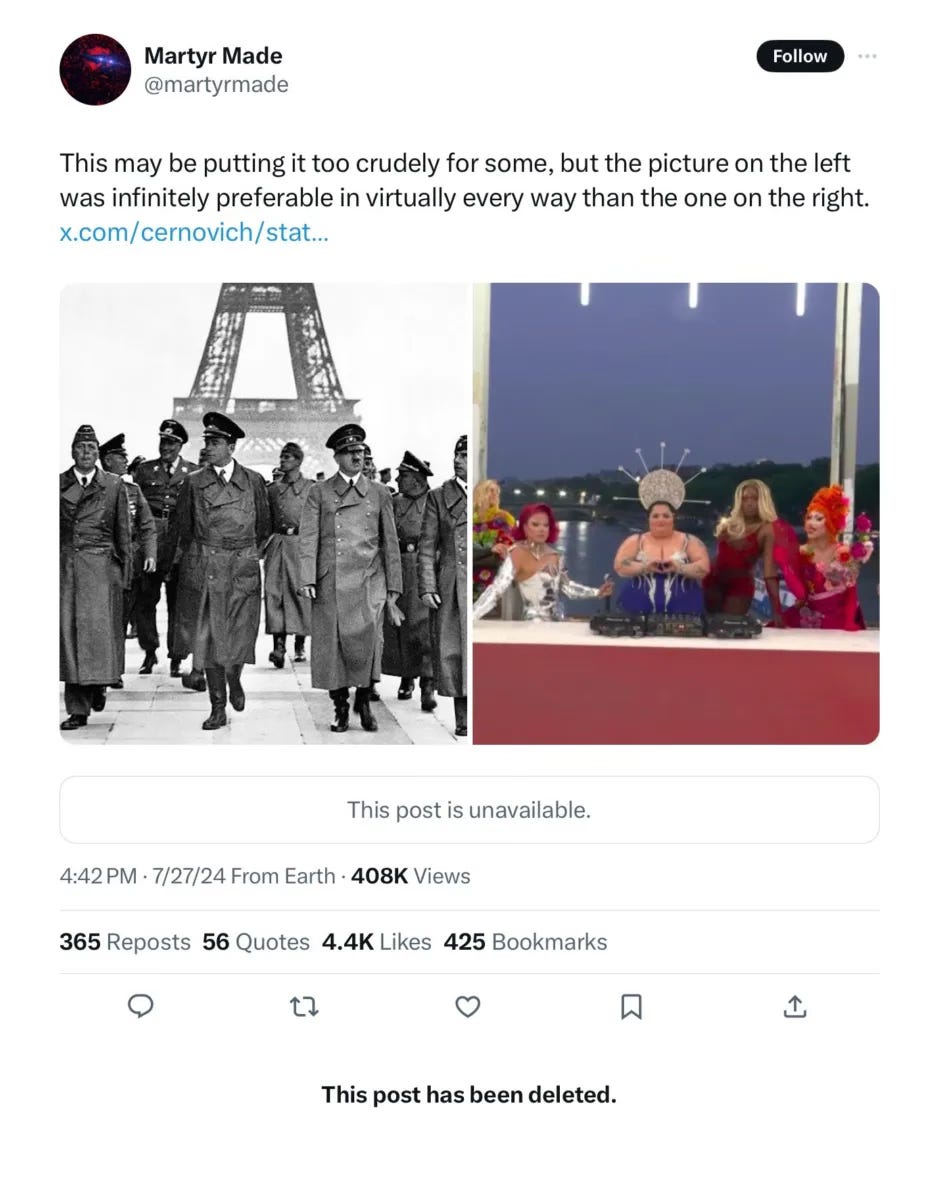The Infinite Complexity of History
A basic misunderstanding puts people in danger of falling for Holocaust denial and others forms of pseudo-history
If you are very far away from Earth — around 6 billion kilometres — our planet famously appears to be nothing more than a “pale blue dot.”
If, however, you come much closer — say you are about as far away as the moon, which is 384,400 kilometres distant, on average — you see that the planet isn’t entirely covered in water. There are also large patches of land. And clouds. Which is to say, by getting much closer to the planet, you see that the planet is more complex than it had appeared farther away.
Get closer still — as close as the International Space Station, 408 kilometres above the planet — and the apparent complexity grows spectacularly. You see mountain ranges and plains. Ice floes. Rivers, deserts, and jungles. This is a very complex rock in space.
And you still aren’t on Earth!
Keep getting closer and the observed complexity repeatedly multiplies. And there is no practical limit to this process.
If you got so close to Earth that you could almost press your eye against a single drop of water — and if the human eye were capable of making observations at this scale — you would see that this single drop of water contains more than one sextillion water molecules. That’s 1,670,000,000,000,000,000,000 water molecules. In a single drop of a water, on a planet with so much water that it looks like a pale blue dot from far out in space.
For humans, Earth is, in effect, infinitely complex.
Now, I’m the History Guy, not Bill Nye, so you may be wondering what I’m getting at.
It’s simple: I think the same basic idea holds for history. From a distance, a big historical event or process looks simple enough you can capture it in a phrase as short as “pale blue dot.”
The invention of agriculture.
The Industrial Revolution.
The Second World War.
But get closer and the apparent complexity grows and grows. This process, too, is effectively infinite. That is why historians can spend a decade or more of their lives, or even their whole careers, studying something as seemingly minuscule as “French labour relations in the interwar period.”
Anyone who has ever seriously studied any slice of history knows this.
You can read half a dozen serious books on a major subject and still only have a looking-from-the-space-station view of that history. There's so much more complexity to discover. This is what makes the serious study of history intellectually humbling: No matter how much you know, there is always much more you don’t. And thanks to the time you spent seriously studying history, you know you don’t know. Socrates would approve.
But most people never seriously study history. Any history. So they never discover that history is, in effect, infinitely complex. That can have serious consequences.
Picture someone who takes the time and effort to watch documentaries and read a book or two about some historical subject. Most people have only a pale-blue-dot perspective on that subject, but this guy’s perspective is much better. It is a from-the-moon perspective.
Or maybe this guy got so hooked by the subject that he sat down and read half a dozen serious books about it. As a result, he has a from-the-space-station view. He knows a lot! His friends tell him so. His experience tells him so. He is, he will tell you, something of history buff. In fact, he might say he’s even an expert — because he doesn’t know how much he doesn’t know.
And remember that human psychology amplifies this effect. As the Nobel laureate psychologist Daniel Kahneman memorably wrote, our default is “WYSIATI” — What You See Is All There Is — meaning that automatically and intuitively we feel that whatever information we happen to have on hand is all the information there is. It takes conscious thought and effort to catch and correct that intuition. But if you have read a number of books on the subject? Why, your intuition may seem perfectly reasonable. Look at all those books on the shelf! You really are something of an expert.
If you’ve ever heard Elon Musk discuss history in an interview — here’s a typical example — you’ve encountered the phenomenon. Musk explicitly says he has read so much military history that he knows pretty much all of it. He is an expert. Is it possible there is much more military history he is unaware of? That the military history he knows is dwarfed by the history he does not know? Apparently not. “There’s hardly a battle I haven’t read about,” he said. When discussing military history, and its application to present problems, Musk speaks with the confidence of an Oxford professor who has spent his whole life studying the subject: He is spectacularly delusional.
Like syphilis, hubris can ravage the mind, and Musk could easily appear in medical textbooks as an illustration of that disease’s progress. There are plenty of people like him opining on Reddit, writing blogs, and producing podcasts. They’re all experts. Or so they seem to think.1
Now, if the only result of this delusion were bad takes about history on Reddit, I wouldn’t have written this piece. However, I think popular misunderstanding of how complex history really is often has bad consequences. In some case, horrible consequences.
Consider the Second World War. Thanks to endless movies, novels, documentaries, and cheesy books, even people familiar with very little history know the broad strokes of that history. They’re well past the pale-blue-dot perspective (“Nazis started it but I’m not sure who was on the other side”) and have, at a minimum, the view from the moon. (“Hitler was Nazi Germany’s leader and he started the war by invading Poland. Then Japan bombed Pearl Harbor.”)
That still means what they don’t know about the war is immense. Which wouldn’t be a problem if they knew at least that. But they never studied history seriously so they have no clue how bewilderingly complex history really is, and don’t know how little they know relative to what there is to know. That’s when things can go badly haywire.
Enter Darryl Cooper.
Far-right gadfly Tucker Carlson called Cooper “the best and most honest popular historian in the United States” when he introduced Cooper for a lengthy interview last September.
Cooper isn’t a historian. As far as I can make out, he has never formally studied history. He’s a self-taught podcaster (with by far the most popular history Substack, along with a monster podcast, meaning he’s raking in immense sums of money. Not Tucker Carlson money. But the sort of money that the world’s leading historians can only dream of.) Of course it is possible — harder, but possible — to be a very good self-taught historian. But Cooper most definitely is not that. (It’s also possible to have a PhD in history and be an atrocious historian, I should note, but that’s a subject for another day).
The main claim Cooper made in that interview is that Churchill, not Hitler, is the “chief villain” of the Second World War. On what grounds? Well, did you know Hitler expressed legitimate grievances? Did you know Hitler offered to make peace but Churchill refused? That wicked Churchill! Allow me to talk relentlessly and tendentiously for hours…
If you think I’m being unfair to Cooper, I could explain how his schtick is simply a reboot of David Irving, a far more accomplished pseudo-historian who had his head handed to him when his claims were carefully adjudicated in a civil lawsuit Irving himself launched. And I could explain how much of David Irving’s work consisted of reheated leftovers from Nazi propaganda. But I won’t bother.
Instead, I’ll just show you what Darryl Cooper tweeted last year, during the Paris Olympics, when the controversy over a reenactment of the Last Supper was underway.
Behold:
Infinitely preferable. In virtually every way.
Note that it was after this tweet that Tucker Carlson praised Darryl Cooper to his immense audience and handed Cooper his microphone for hours. Also note that Tucker Carlson promotes the “Great Replacement Theory,” which posits that nefarious elites (stage whisper: “Jews!!!”) are conspiring to replace white populations in Western countries. Birds of a feather goose-step together.
In the Irving trial, David Irving was gutted by a painstaking analysis conducted by Professor Richard Evans, one of the great historians of the Third Reich, and two assistants. Evans concluded: “If we mean by historian someone who is concerned to discover the truth about the past, and to give as accurate a representation of it as possible, then Irving is not a historian.”
Neither is Darryl Cooper.
But, look, this isn’t about Darryl Cooper. It’s about how people are lured into believing nonsense about history.
Picture an ordinary American, John Doe, who loves movies and spy novels. He watches the occasional war documentary, almost always about the Second World War. And now and then he’ll read a history book … also, almost always about the Second World War. The books he reads are popularizations written by journalists and amateur enthusiasts but John thinks they’re gold-standard scholarship because he has never seriously studied history. And because he has never seriously studied history, he has no idea history contains endless layers of complexity, and has no idea how little he knows relative to what there is to know. But he does know that he knows much more about the war than his friends and colleagues. Which is why he calls himself, with a little pride, a “history buff.”
John is listening to Tucker Carlson one day and Carlson introduces a guy who is, he says, the best popular historian in America. And he’s going to talk about the war. Cool!
This guy says, hey, did you know Hitler had legitimate grievances? Germany was screwed after the First World War. It had land taken. It was forced to demilitarize. Germany was humiliated, and bankrupted, and deliberately made weak. And Germany hadn’t even been beaten in the war. It was stabbed in the back by internal enemies. And this guy knows so much history! He knows tons of details about the Versailles Treaty and German demilitarization and Churchill’s war-mongering and how the new states of Poland and Czechoslovakia persecuted Germans living on lands torn away from Germany to make those new countries. This guy really piles up facts! What an amazing historian.
And this guy, this great historian, is telling John Doe that the old story about Hitler being the bad guy and Churchill the hero is a lie. It’s upside down.
John’s mind is blown. Why have I never heard any of this before?
John thinks maybe he’s been lied to. That people have deliberately left facts out. To keep the truth from being known.
Who has done this? It would have to be a powerful interest group.
A lobby that hates Hitler.
A lobby with long tentacles.
Able to organize around the world.
To carry out conspiracies over decades. Even centuries.
Hmmm… Who could it be?
These may only be foggy notions, but if John turns to Google to learn more, Google will quickly connect him with reams and reams of highly detailed explanations about how, yes, there is a powerful interest group that has been lying about the war for eighty years. And it turns out, when you read these highly detailed explanations, that the same powerful interest group was responsible for the war in the first place!
It’s the Jews. It’s always been the Jews. They hated Hitler because Hitler was on to them. So the Jews destroyed Hitler. Ever since, they deceived John and everyone else about the war. And so much more.
It all makes sense now. And it’s all backed up with facts. So many facts.
Another anti-Semitic idiot is born.
It’s important to note that the basic methodology of people like David Irving does not involve the creation of crude frauds. The key mechanism is a grossly imbalanced and intellectually dishonest assessment of evidence.
Irving started with a conclusion — notably “Hitler has been wrongly condemned.” Then he judged evidence according to how it suited his argument. If evidence contradicted Irving’s desired conclusions, he was severely skeptical of it, demanding the highest possible standards and dismissing anything that wasn’t solid gold. But if it supported his conclusion, he dropped skepticism entirely. Nothing was too flimsy to embrace as compelling proof.
If you consistently apply wildly different standards to masses and masses of evidence — and remember, history is infinitely complex, so the supply of evidence is effectively bottomless — you will eventually make a powerful case for your desired conclusion. No matter what the truth is. Even if your desired conclusion is screaming nonsense, if you process enough evidence with enough prejudice, you will eventually put together a superficially compelling case.
In a sense, what I am describing is garden-variety confirmation bias. But it is also confirmation bias supercharged by intelligence, energy, and ideology. And supercharged by the near-infinite complexity of history, which provides near-infinite opportunities for bias and intellectual dishonesty.
People often assume those who peddle Holocaust denial and other historical nonsense are knuckle-dragging cretins, but typically that’s only true of the angry people in the comments section. In fact, the major figures promoting pseudo-history tend to be extraordinarily intelligent and energetic. They have masses and masses of facts at their fingertips. They know so much! And that’s a big reason for their appeal, because, to the incautious — to those who don’t understand how complex history is or how easy it is to distort the truth with dishonestly collected facts — they sound like very smart, highly informed people. So it seems perfectly reasonable to be persuaded by them.
The smarter neo-Nazis understand this process and use it deliberately. While their dimmer colleagues make websites full of swastikas, reverent photos of der Führer, and raging screeds against Jews and other monsters, these people do something quite different.
In fact, I decided to write this post after spending a little time following one of these people here on Substack.
I won’t link to the account, for obvious reasons, but I must say, as propaganda, it’s well done. This person (or persons) combs through old archives looking for interviews or films or anything at all that may cast doubt on the orthodox framing of the Second World War. He (or she or they) post them without comment. In fact, to a casual observer, the account’s posts often look like nothing more than the posts of an ordinary history buff. Only in the comments do the account’s dumber followers drop the mask and go on tirades about JEWS!!!
A recent post is typical. It is simply a transcript of a 1981 interview with Karl Wolff, who had been a high-ranking SS officer in the Second World War. Based on its content and tone, I suspect it’s authentic, but I don’t know its true source. (At the bottom of the post, the account operator(s) says he/she/they found it another website. Go to that website and you discover it is a classic neo-Nazi production full of swastikas and sexual neuroses.)
But let’s focus on the content of that interview.
The unnamed interviewer starts with this question: “Germany is accused of starting the war, by invading Poland, who was not a threat to Germany. Can you comment?”
You must always ask the question “why”, why did we attack Poland, why were people killed, why were there camps, and why did we come up against such resistance. We attacked Poland because Poland put us in a position that we had to protect our people who were left in Poland after Versailles, they were being persecuted and Poland refused to take action. They were a weak-minded state that was being pressured by England to fight us; all we wanted was a land bridge to East Prussia, and freedom for our people living in Poland. The Führer said he regarded Poland as a friendly state until England got involved, telling Poland to not work out anything with Germany as we cannot be trusted.
Those in our government who had ties to Poland tried everything to get the leaders to listen to us, and give us concessions, as we were offering Poland concessions. These requests were met with contempt and bravado. Attacks on our frontier by bands of criminals were not investigated by Poland, and brushed off. Even to the point of claiming we were making this up. We could have allowed this to go on, and waited Poland out until they came to their senses, however the plight of Germans in Poland could not wait, as horror stories started coming from refugees seeking the protection of the Reich. There was hardly a crime in attacking Poland; any nation faced with the same scenario would have acted as we did.
Now think of the person who has the view-from-the-moon of the Second World War. He knows Germany started the war by attacking Poland. And not much more.
Yet here is this understated German official offering masses of details about how Germany had been crippled by Versailles, and Germans living in Poland were being victimized, and Polish criminals were crossing the border to carry out crimes in Germany, and Germany only wanted a land-bridge to Danzig, and the Poles refused to help or make any modest concessions because England was pushing them into a war. So many facts and details! It’s impressive. And for someone who has never heard the German case before, and knows absolutely nothing more about these arguments than what you’re getting here — and does not know that history is always more complicated than you think — it may sound so very reasonable.
Hey, Germany had a pretty good case! And we have been lied to!
What Wolff says here is what Germany argued through 1938 and 1939, and in Britain and America, appeasers who wanted to avoid war at all costs accepted and repeated some of it, while isolationists and Nazi sympathizers repeated much or all of it enthusiastically. Others who understood the character of the Nazi regime better — including Winston Churchill — saw it as nothing more than cynical propaganda disguising a policy of naked conquest and extermination which had been Hitler’s intention at least since the writing of Mein Kampf almost 15 years earlier. So who was right?
The end of the war brought masses of evidence to light and serious historians stopped debating long ago: Hitler started it. Nazi Germany was to blame. Wolff’s claims are piles of official lies. He may have sincerely believed them in 1981, given the psychological imperative to believe you are on the side of the angels. Yet lies they remain.
But for someone who has never heard any of those lies before? Who doesn’t know that historians long ago discarded them as nonsense, much less why? And most importantly, who does not know that his own knowledge is only the view-from-the-moon and history is always far more complicated that what he perceives? For that person, encountering the case for Germany, without any rebuttal, can easily take him somewhere false. And dark.
And the ramifications of this process don’t lie only in the past.
To take only one example, the disingenuous arguments Hitler made about protecting ethnic Germans in the new countries to his east and south are remarkably similar to the arguments made by Putin about protecting ethnic Russians in the new countries to his west and south, including Ukraine. If you know the historical parallel, you will at least be skeptical of Russian claims today. If not, you may take those claims at face value. And find yourself supporting horrors.
History matters.
Just as this post is not about Darryl Cooper, per se, neither is it about neo-Nazis or Holocaust denial or other forms of far-right distortions.
It’s about the many varieties of ideologically driven pseudo-history.
I’ve talked at length with Holocaust deniers whose mastery of whole clouds of facts — or rather “facts” gathered with extreme prejudice — is superficially impressive.
I’ve also talked to black Americans who insist — with equal mastery of “facts” — that no black Africans voluntarily participated in the slave trade.
And far-leftists who argue American history has never been anything but a relentless litany of exploitation, greed, and murder.
In each case, ideology is obviously driving the collection of facts in a classic process of conclusion-based evidence-making. But where did the ideological belief come from in the first place?
That’s where my “pale blue dot” theory comes into play: Not understanding that history is infinitely complex leaves people vulnerable to zealots and ideologues promoting pseudo-history. After conversion, the most intelligent and energetic of the deluded may themselves become one of the zealots and ideologues.
To inoculate ourselves against such infection, we need to always remember that history is infinitely complex and if that complexity is not handled with intellectual integrity it can badly mislead us.
History: It’s more complicated than you think. Always.
If you’re thinking, “what about you, Gardner? Here you are writing a blog. Do you think you’re an expert or something?” No. Emphatically no. I studied history seriously (got the masters degree to prove it) and I am well aware that for every drop of historical knowledge I possess there are lakes and oceans of which I am ignorant. Even on the few subjects I would say I have considerable familiarity with, I can, off the top of my head, name many historians next to whom I am little more than a bar-room trivia champ. So I would describe myself not as an expert but merely a jack of many trades, an enthusiastic amateur, an explorer who enjoys learning and sharing what I learn. That’s it, that’s all.






You would love the NFB Film Cosmic Zoom. I used it once to open a international meeting. When it finished ( It is not long), an older Indonesian said quietly. "It is a prayer"
- It begins with a boy rowing a boat on the Ottawa River.
- The camera then zooms out—past Earth, the solar system, and deep into the universe.
- Then it zooms back in, returning to the boy, and dives into the microscopic world through a mosquito on his hand.
- The journey ends at the atomic level, before zooming back out to the original scene.
It’s a mesmerizing visual exploration of scale—from the cosmic to the cellular—and all without a single word. You can watch it on the NFB’s official site if it’s available in your region.
https://www.nfb.ca/film/cosmic_zoom/
To paraphrase Dr von Newman, “facts are like people, torture them enough and they’ll tell you whatever you want to hear."